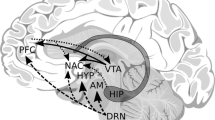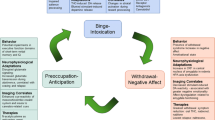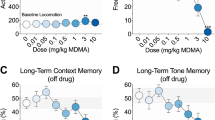Abstract
Preclinical studies suggest that acoustic startle amplitude is increased during ethanol withdrawal. The current study evaluated the effects of intravenous infusion of the α2-adrenergic antagonist, yohimbine (0.4 mg/kg), the serotonin partial agonist m-chlorophenylpiperazine (mCPP, 0.1 mg/kg), and placebo administered to 22 male patients meeting DSM-III-R criteria for alcohol dependence and 13 male healthy subjects. Patients and healthy subjects completed 3 test days under double-blind conditions in a randomized order. Patients were sober for 12–26 days prior to testing. On each test day, participants completed startle testing 80 min following drug infusion. Stimuli with varying intensities (90, 96, 102, 108, 114 dB) were presented in a randomized order balanced across four blocks. Stimuli consisted of 40-ms bursts of white noise administered every 45–60 s for 15–20 min through headphones. Analyses indicated that patients exhibited elevated acoustic startle magnitudes on the placebo day relative to healthy subjects. In patients, the magnitude of startle amplitudes elicited at 90 dB, but not 114 dB, correlated significantly with the number of previous alcohol detoxifications. Yohimbine increased startle magnitudes and reduced startle latencies relative to placebo and mCPP in both patients and healthy subjects. mCPP did not alter startle magnitude in either group. Yohimbine also increased the probability that a 90-dB stimulus produced a startle response in healthy subjects, but not in patients. Blunting of yohimbine effects on startle probability may reflect the baseline elevations in startle probability levels in patients, but may also be consistent with other evidence of reduced postsynaptic, but not presynaptic, noradrenergic function in these same patients. These data replicate and extend previous reports indicating that yohimbine facilitates the acoustic startle response in humans. They also further implicate the number of episodes of ethanol withdrawal as a factor influencing subsequent neurobiological responsivity in chronic alcoholic patients. Based on the current data, future research should explore whether measurement of the acoustic startle response provides an objective quantitative severity measure of ethanol withdrawal.
Similar content being viewed by others
Author information
Authors and Affiliations
Additional information
Received: 31 August 1995 /Final version: 4 October 1996
Rights and permissions
About this article
Cite this article
Krystal, J., Webb, E., Grillon, C. et al. Evidence of acoustic startle hyperreflexia in recently detoxified early onset male alcoholics: modulation by yohimbine and m-Chlorophenylpiperazine (mCPP). Psychopharmacology 131, 207–215 (1997). https://doi.org/10.1007/s002130050285
Issue Date:
DOI: https://doi.org/10.1007/s002130050285




